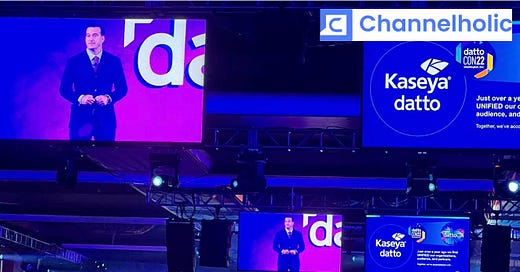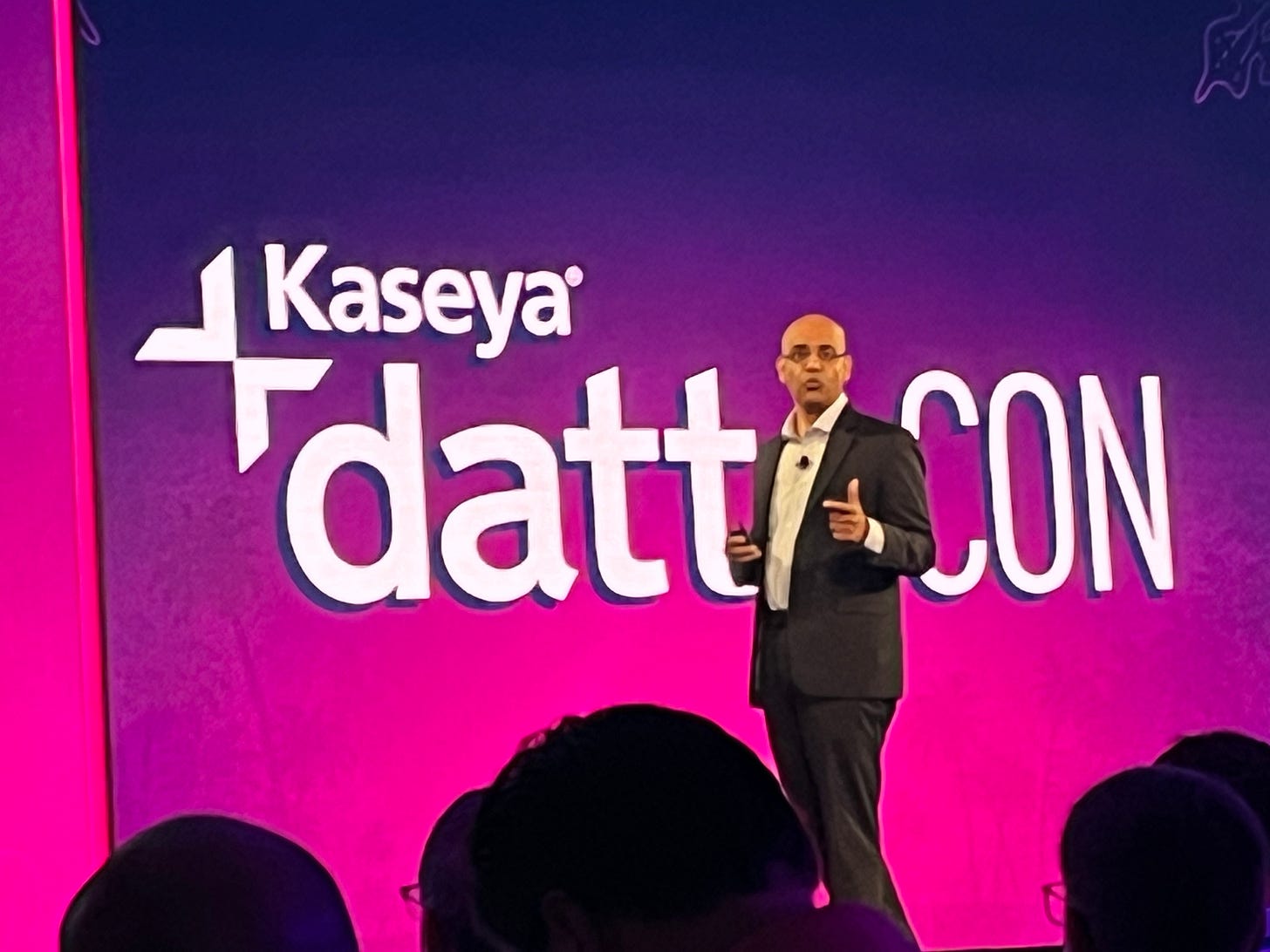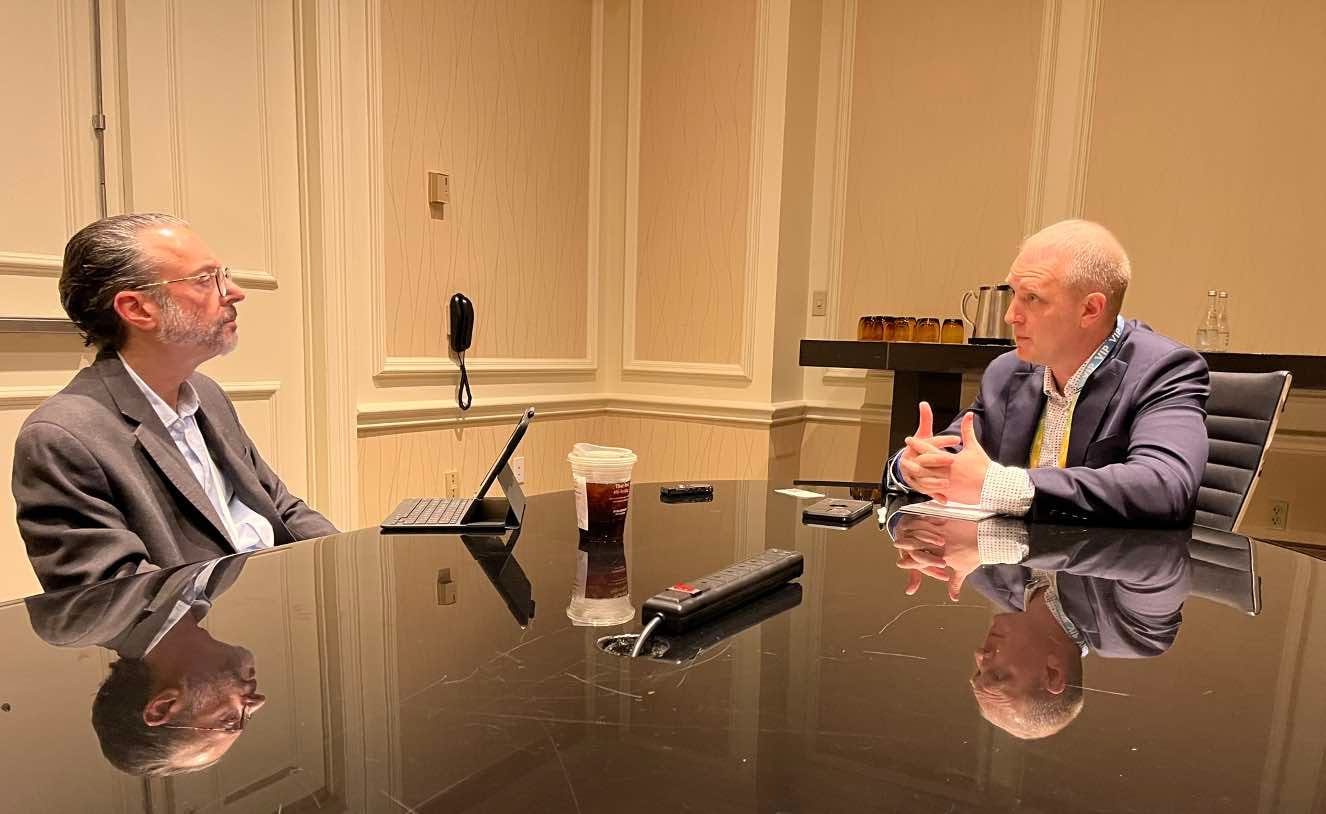Kaseya’s Not-So-Unspoken Partner Compact: Longer Contracts, Lower Prices
It’s a deal the company discussed at its DattoCon event along with networking, AI, and a mysterious forthcoming something set to “fundamentally alter the MSP industry”.
Spend enough time reading comments about Kaseya on social media or talking to its partners, and you’ll quickly run into complaints about how aggressively the company prods its partners toward long-term contracts. That criticism usually overlooks the lower prices associated with those longer terms, however.
Listen to CEO Fred Voccola (pictured) speak during a conference like this week’s DattoCon event in Miami, on the other hand, and you’ll probably hear him tout the margins partners collect thanks to the company’s low prices without saying much about the longer commitments required to collect those savings.
Somewhere between those poles, I sometimes think, is an unspoken compact between Kaseya and its partners that no one’s in a rush to acknowledge: yes, they’re going to steer you into longer contracts to the best of their ability even if you don’t much like longer contracts, but they’re going to reward you with lower costs and higher profits in return.
Voccola, as it happens, agrees with everything I just wrote except the “unspoken” part.
“I don’t think we hide that. We’re upfront about it. We’ve been saying that for years and years and years,” he explains. “It’s less expensive if you do a longer-term contract. I think every business runs that way.”
Or at least should run that way, he continues, and that includes managed service providers. “If MSPs are doing month-to-month contracts with their customers, their company’s a lot less valuable than those that do annual, three-, or even five-year deals.”
In fact, Voccola would pretty clearly prefer to get rid of month-to-month contracts himself all things being equal. “If we start a new product tomorrow, we’ll offer one-year and three-year contracts,” he says. As Voccola is acutely aware, though, all things aren’t equal when it comes to Datto licensing in particular.
“Datto products have historically had three-year, one-year, and month-to-month [contracts],” he says, and they still do. It just costs even more than before to go month to month relative to multiyear.
That’s understandably frustrating to partners who hate getting locked in on contracts, but the payoff for enduring that discomfort can be meaningful. On average, Voccola told DattoCon attendees during a Tuesday morning keynote, Datto products are now 15% cheaper than before the acquisition.
“Some products didn’t get pricing reduced, some products were reduced more, some products were reduced more on longer-term commitments than shorter-term commitments,” he said. “But on average we reduced prices 15%.”
Which looks even better when you consider that the average SaaS vendor raised prices nine to ten percent last year, he added, citing unnamed sources. “Not only did we not raise them, we lowered them on average about 15%,” Voccola said. “That’s important because that allows Kaseya’s products to be more affordable and you to make more money.”
It would also be impossible, he noted in our interview, without long-term deals. “We have predictability, so we can fund product and R&D.”
It all adds up to a tradeoff that feels reasonable to Michael Goldstein, president and CEO of LAN Infotech, an MSP and solution provider in Fort Lauderdale, Fla. “I don’t mind the three-year contracts,” he says, especially concerning RMM and PSA software. Sure, something better than what he’s got now could come along 18 months into a 36-month deal, but the pain of switching platforms is likely to outweigh the potential gains.
“A lot of the core products, we’re not looking to make a change,” Goldstein notes.
You may or may not agree, and you may or may not like the tradeoff Kaseya is offering you. It’s hard to contest the logic of that tradeoff though. Doing so could be dangerous in fact, Voccola warns CEO peers.
“I think if you look at the vendors that have fallen behind or gone by the wayside in the last 10 years in the space, a lot of them didn’t have the right business models. They ran out of money. They couldn’t do things because they didn’t have a responsible business,” he says. “We give more integration, better features at a lower price, and we’ll be here in a decade.”
Datto Networking’s monster TAM
I heard Marcus Ward, the GM in charge of Kaseya’s Datto Networking suite, speak at last year’s DattoCon. To the best of my knowledge, that’s as close as I’ve ever come to meeting him. Someday I’d love to buy him a beer and ask him what June 2022 was like for him.
That was a month that began with him making waves online for informing partners in official company correspondence that Datto was getting out of the switch market and partially discontinuing its edge routers. The next week he sent out a follow-up letter rescinding everything he said in the first one. A couple weeks after that, Kaseya announced that its Datto acquisition was officially complete. And sometime around then, Ward had what I assume was his first meeting with Voccola, during which Voccola vividly recalls asking this question:
“What would you do with it if we gave you $40 million a year of additional resource? He literally looked at me and laughed. I’m like, no, I’m serious,” Voccola says.
And he was. Kaseya spoke about investing “tens of millions” in Datto Networking this week versus $40 million specifically, but it’s clearly poured a lot of money into the product unit, which was racing into the dustbin before the Kaseya deal. Ranjan Singh (pictured), Kaseya’s chief product officer, can point pretty easily to some specific examples of where that money’s gone.
“We had 20 R&D engineers when we acquired Datto focused on networking. We now have 54 and growing,” he says. And far from discontinuing networking products, Kaseya plans to raise one from the dead, the managed power device Datto first unveiled at DattoCon 2017.
“That’s a product that Datto killed three years ago,” Singh says. “We’re making investments to revive that.”
And none of that’s new. Voccola, in easily overlooked remarks (I know I barely mentioned them in my reporting at the time), called Datto Networking “an amazing business” at last year’s DattoCon and promised to make “huge investments” in it.
“It’s one of the things that I personally was the most jazzed about” when negotiating the Datto deal, Voccola told me this week, for a simple black and white and very green reason.
“The TAM is enormous, the total addressable market,” he says. “We think that’s a monster market.”
He’s talking about the SMB networking market specifically, and it’s enormous for reasons that Cytracom and Hewlett Packard Enterprise could also tell you, per stories earlier this year in Channelholic: every SMB on earth needs a network and none of the existing network product leaders has ever done a great job meeting that need, because that’s not where the money is.
“A large networking company might do $200 million, $300 million, $500 million a year in the MSP space, but the company does $25 billion. So who do you think gets the attention?” Voccola asks. “It’s an afterthought. For us, it’s not an afterthought.”
Indeed, it’s the only set of customers Kaseya cares about, which allows it to tailor a product family to an MSP’s exact needs. “It’s a comprehensive network suite that’s purposely built for MSPs, which means it’s not expensive, it’s simple to configure, it’s easy to use, and it’s available,” Voccola said during his keynote this week.
The “available” part of that statement alludes to millions of dollars Kaseya has spent stockpiling inventory to immunize itself from supply chain problems. The “simple” and “easy” parts reflect all the effort the Datto Networking team has put into engineering products for people who can’t spare time or money to amass networking expertise.
“Networking management should be embedded in the workflow, not something that you need a Cisco CCNA certified technician to come here and learn,” Singh says. “Because our customers don’t have that luxury. They can’t afford to have a Datto Networking technician that’s certified on their payroll. That’ll be too expensive. So our goal is to democratize managing networking.”
It's an opportunity that’s Kaseya’s to lose, Singh continues. “We should dominate networking in the SMB space for one very simple reason. We are the only ones that are building networking solutions for this market.”
Cytracom and HPE, among others, might dispute “only” but it sure does feel like there’s a big opening out there for someone to crack the code on a market that HPE thinks will be worth $2.3 billion this year alone.
Kaseya’s AI strategy: don’t “eff things up”
Earlier this year we congratulated Kaseya rival ConnectWise for striking a careful balance between speed and responsibility on adding artificial intelligence to its products. Conversations with multiple Kaseya executives this week suggest they deserve similar credit.
Arguably the biggest news at DattoCon this year was the introduction of Cooper Bots, AI-powered autonomous assistants for various Kaseya solutions due to start shipping soon. The company could have simply added that functionality to its products and enabled it by default. Instead, it will require users to enable it themselves. And then confirm that they truly, definitely, positively want to enable it a few more times.
“They’re asked if they really want to, and then they’re asked if they’re really sure they want to,” Voccola says. “We’re overcommunicating to the nth degree.”
That’s in keeping with what Voccola called a “conservative” approach to AI during his keynote and then called “thoughtful” in our interview the next day, and for a clearly defined reason. AI is a powerful tool.
“It also has the potential to really eff things up,” Voccola says, “so we’ve been gradual.”
Even when it isn’t easy, notes Singh. “Our private equity owners are after my life. ‘You’re not moving fast enough!’” he says. “We want to move fast, but we want to make sure the approach is secure, it’s legal, and we’re doing it the right way in every geography where we’ll operate.”
In fact, to an extent some companies might find surprising, the senior-most members of Voccola’s leadership team are all but lining up to take the blame for Kaseya’s cautious pace on AI.
"I will be the first one to say that if it’s anyone’s fault why we’ve slowed down, it’s probably mine,” says CISO Jason Manar (pictured), “because I want to ensure that we know where that data is going, what data we’re putting in, and that we have total control over every single data point that we’re putting into any kind of AI model.”
That’s in keeping with a larger security obsession at Kaseya inspired by the disastrous hack of its VSA remote monitoring and management solution in 2021. “[Ranjan] and Fred both have made it known, regardless of the killer features or feature set, we have to have security first and we have to have a security-first mindset. And if that means that we miss a date on a release, we miss a date on a release,” Manar says.
Singh has an additional concern about AI, namely that it can be “a solution looking for a problem to solve” if you’re not careful.
Job one on artificial intelligence is to make sure everything Kaseya does with it is safe and lawful, he says. “Number two is make sure we focus on a solution that really needs to be solved and AI is the most effective way to solve it.” The productivity-boosting work that Cooper Bots do clears that bar. Adding ChatGPT to Autotask for the sake of doing so doesn’t.
Let the speculation on Kaseya’s forthcoming bombshell begin!
Your guess is as good as mine as to what it is, but Kaseya has something big coming next April at its Connect Global conference in Las Vegas. How big? And what is it? Best way I can think of to answer those questions is to provide this lightly edited excerpt from my interview with Voccola on Wednesday.
Voccola: “It’s not an acquisition. Kaseya’s not getting sold. We will probably announce some acquisitions, but the big announcement’s not an acquisition. It’s not an IPO or anything, not that people would care about that. It will be the most impactful and largest announcement that the MSP channel has ever heard. It’ll be the most positively impactful thing for every single MSP, without question. It’s going to fundamentally alter the MSP industry.”
Me: “And now you’re going to make me wait six months to find out. Can you even put me in a ballpark of what zone we’re in?”
Voccola: “I totally could.”
Me (chuckling): “And yet you won’t. I mean, is it a sales and marketing kind of thing that’s going to help them sell better?”
Voccola: “It’s going to fundamentally alter their economic model, their service delivery model, their customer experience model more than anything that’s ever been done.”
I have a theory about this, but I’m keeping it to myself for the moment while I ponder it some more. Have one of your own, or even just a wild guess? My address is rich@channelholic.com. Drop me a line.
Also worth noting
Hyperautomation leader Rewst (who you’ve read about here before) has rolled out 50 pre-built automations.
PartnerOptimizer (who you’ve also read about here before) has shipped a fall release that adds ecosystem and revenue opportunity analysis, AI-backed search, and more.
Nodeware’s continuous vulnerability management solution now feeds data to vCIOToolbox’s solution for use in compliance and business reviews.
The world's thinnest and smallest 17-inch foldable PC, a new conference room as-a-service subscription model, and a bunch of new printers are among the many devices and services unveiled by HP at its Imagine 2023 event.
Arcserve and Wasabi are collaborating on cloud storage and data protection.
For fans of free: Zyxel’s offering a three-year license to its Connect & Protect Plus security service with the purchase of a NWA110AX 802.11ax Wi-Fi 6 access point.
Jordan Solender is the new customer experience czar at Procure IT.









Thanks, Ted! Sorry I didn't bump into you at the show, but then again it was kind of a madhouse.
Great summary, Rich. Quality reporting on precisely what I heard in Miami.